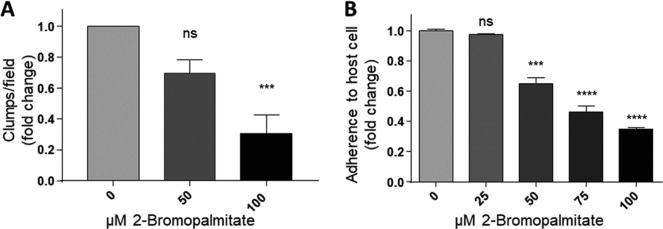Fig. 6.
2-Bromopalmitate treatment inhibits T. vaginalis aggregation and attachment to the host cell. A, B7RC2 parasites (106 cells/ml) were treated with 50 or 100 μm of 2-BP for 4 h. Thirty 10× fields were visualized and the number of clumps per field was quantified. Four independent experiments were analyzed. Data are expressed as fold change related to untreated control parasites ± the standard error of the mean (S.E.). ANOVA followed by Tukey's post hoc test were used to determine significant differences. ***p < 0,001, ns; non-significant. B, Parasites were treated 16 h with increasing doses of 2-BP, washed, fluorescently labeled and incubated with HeLa cell monolayers for 30 min at 37 °C. Coverslips were washed to remove unbounded parasites, mounted and attached parasites were quantified by fluorescence microscopy. Data are expressed as fold change related to untreated control parasites ± the standard error of the mean (S.E.). ANOVA followed by Tukey's post hoc test were used to determine significant differences. ***p < 0.001, ****p < 0.0001, ns; non-significant. A representative experiment of three independent experiments is shown.

